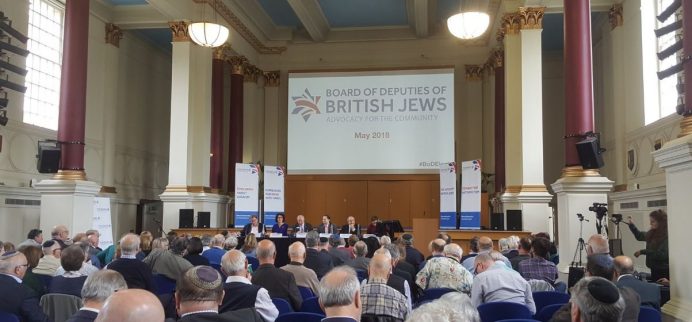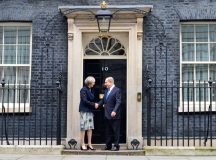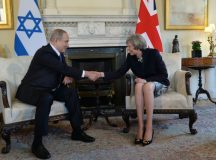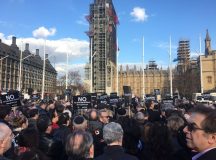In July 2018, an opinion piece in the Jewish Chronicle identified ‘fundamental questions which must now be urgently asked’ in light of what it termed the ‘potentially seismic change’ indicated by recent developments within the Anglo-Jewish community and its relationship to Israel. The Fathom editors believe there is a place for the journal to provide a platform to some of the voices in this debate to express their views. In this context, Fathom invited Mick Davis, Rabbi Laura Janner-Klausner, Dr Keith Kahn-Harris, Dr Toby Greene, Robin Moss, Simon Gordon, Tamara Berens, Jonathan Hunter, Hannah Weisfeld and Maya Ilany to share their opinions. Download the full symposium here.
Fathom Journal: The Jewish Chronicle (JC) posed the question ‘what exactly is the centre ground for British Jews on Israel now?’ How would you answer that question?
Toby Greene: In short, the centre-ground consensus is a clear commitment to Israel as the nation state of the Jewish people, but beyond that British Jews are increasingly polarised, and their divisions reflect deep tensions and sharp dilemmas within Israeli politics and society.
The evidence is clear that the overwhelming majority of British Jews are ideologically committed and personally connected to Israel. A 2015 survey showed that 90 per cent support Israel’s right to exist as a Jewish state and 93 per cent say it forms some part of their identity as Jews. There is also a clear correlation between active engagement in Jewish life and attachment to Israel.
More than that, Jewish life in Britain is increasingly ‘Israelised’ – shaped by Israel – and this trend will continue. In demographic terms, Israel has already overtaken the US as the world’s largest Jewish community and in time will become home to a majority of the world’s Jews. Aside from being the historical and biblical homeland of the Jewish people, Israel is a phenomenally vibrant and exciting society. British Jews visit Israel ever more frequently thanks to cheap air travel, and Israel Tour and Birthright have made spending time in Israel a key resource for deepening Jewish identity. Meanwhile the reinvigoration of British Jewish life in recent decades (exemplified by Limmud, JW3, the Jewish Film Festival and Jewish Book Week) have created new venues for British Jews to absorb Israel’s cultural richness. Religiously, Israeli educational institutions are increasingly influential, especially for the dominant Orthodox and ultra-Orthodox streams, which are growing further as a proportion of the British Jewish community. Though some European Jewish intellectuals, and some grass roots groups would like to de-Israelise European Jewish identity, they are a tiny minority and will remain so.
However, Israelisation of British Jewish life has two problematic consequences. First, antisemitism has also been Israelised, with anti-Zionism now a mask for anti-Jewish prejudice, illustrated most tragically in the British Labour Party. Anti-Zionist views once marginal in the UK, have been given a tailwind by the transnational BDS movement, coupled with the illiberal shift in Israel, growing political activism among British Muslims, and now the far-left capture of Labour.
Second, the increasing polarisation within Israel over fundamental issues – including the Palestinian question, the balance between Israel’s Jewish and democratic character, and the status of different streams of Judaism – exacerbates divisions within British Jewry. On the Palestinian question, survey data suggest British Jews overall are marginally to the left of Israeli Jews (e.g. approximately 60-70 per cent of British Jews supporting a two-state solution compared to 50-60 per cent in Israel), but those more engaged in Jewish life, and more religiously observant, tend to be more to the right. Because of the existential character of these questions for Israel, and the centrality of Israel in the ethnic identity of British Jews, these divisions are highly sensitive and very explosive.
FJ: What kinds and forms of criticism of / engagement by British Jews with Israel and Israeli policy and practice do you consider acceptable / most effective, and which are unacceptable / least effective?
TG: British Jews need to find effective ways to promote their values in Israel through deep engagement with Israeli society, whilst official representative bodies (the BoD and JLC) need to clarify and depoliticise their important Israel role.
Israel is the nation state of the Jewish people. Diaspora Jews give important political and financial support to Israel, and what happens in Israel increasingly affects Jews everywhere, on issues ranging from the status of ‘who is a Jew’ to the physical security of Diaspora communities. As such, British Jews, like other Diaspora Jews, have a right to have their concerns and views listened to with respect in Israel. Without such an opportunity, there is a risk of frustration turning to anger, apathy and disengagement.
A central challenge, therefore, is to find meaningful and appropriate ways for British Jews to express their views and promote their values directly within Israeli society. This includes ways to make their views known directly to Israeli decision makers and representatives, and working with partners in Israel.
However, the right to engage critically comes with some provisos. First, a critical engagement with Israeli society is only relevant if it is based on a deep and irrefutable commitment to Israel as the nation state of the Jewish people.
Second, Diaspora Jews keen to promote and defend liberal values and concerns, need to be careful and sensitive when it comes to finding the most appropriate partners in Israel and the right approaches. This is a difficult issue, because political debate in Israel, as in other democracies, is becoming ever more polarised and acrimonious, and because of the weakness and disarray of the Israeli Left. Diaspora Jews need to ensure they grasp the real concerns and feelings of the Israeli mainstream. Partnering with marginal groups who are not trusted by the mainstream can be counterproductive. They also need to make sure they are engaging in genuine dialogue with, and seeking to better understand, those parts of Israeli society with which they do not agree, including the national religious, settlers and haredim.
Third, Diaspora Jews need to tread especially carefully on issues relating to Israel’s security. It is Israelis who are confronted by the immediate consequences of security-related decisions. They face the threat of rockets or other terror attacks on the home front, and they send their children to the army. Diaspora Jews should keep this in the forefront of their minds when they want to voice opinions about Israeli military activity, or potential territorial compromises with major security implications.
Where left-leaning British Jews also need to be more careful is in reacting to what is happening in Israel by campaigning for British political leaders to put pressure on Israel. (I would argue that here the UK is different from the very specific circumstances in the US.) Taking this approach opens groups up to the accusation of disloyalty within the community and from Israelis, which undermines their right to be heard as a respected voice within the tent. It is also unlikely to have a net positive effect, since external pressure on Israel, unless very carefully calibrated, can be utilised politically by the populist-nationalists (represented in the current government) as much as by liberals.
Another risk for Jews engaged in campaigns against Israeli policies in the UK political space, is giving the impression that their real priority it to publicly cleanse themselves of the guilt of association. The Kaddish in Parliament Square was an extreme but illustrative example. Though many participants had good intentions and reasonable concerns, the nature of their protest gave the impression that they wanted – most of all – to publically disassociate from Israel and other Jews, like the ASHamed Jews satirised in Howard Jacobson’s novel The Finkler Question. Those who act as though they are out of the tent, especially with the bitter winds of anti-Zionism blowing from the Left, risk finding their voices rejected within it – a mistake to be avoided.
However, there is a flip side to this equation. Communal bodies whose mission is to represent the community as a whole (the Board of Deputies and Jewish Leadership Council), can help by depoliticising their organisational role regarding Israel. They should reflect the pride and commitment that the community has for Israel, and the deep role that Israel plays in Jewish identity and culture. This includes playing a leading role in the fight against anti-Zionism and BDS. But they should be very cautious about taking a stance on particular Israeli decisions or laws unless they directly impinge on the status of British Jews, or unless they are very confident that they represent an overwhelming communal consensus. Instead, they should seek a language reflecting the broad based commitment of British Jews to Israel, without taking a stance on the political questions that divide both Israeli and Diaspora Jews, whether they be actions by the Israel Defense Forces, or controversial legislation such as the Nation-State Law.
This balancing act is challenging, but vital for organisations or leaders who wish to represent the community as a whole, and not make particular sections feel they need to articulate their own distinct positions to the British government. I have attended one of the regular meetings where Foreign Office officials invite representatives of British Jewish organisations in for a roundtable. The cacophony of conflicting voices is not a very edifying sight, and no-one seems able to represent a consensus view.
FJ: What responsibilities do British Jews have to not give a tail wind to those who would demonise Israel, and how should they avoid doing so in practice?
TG: Jews who care about liberal values need, as far as possible, to oppose the entrenchment of the occupation as if there is no anti-Zionism and oppose anti-Zionism as if there is no entrenchment of the occupation.
I say, ‘as far as possible,’ because in reality these two issues cannot be completely separated. The entrenchment of the occupation fuels (though is not the cause of) anti-Zionism, and in turn anti-Zionism (and the BDS campaign) undermines those who would like to work for a two-state solution. But from the perspective of the liberal Jew in the Diaspora, it is critical to recognise that both anti-Zionism, and the illiberal policies of populist-nationalists in Israel, are both significant threats to Israel as a Jewish and democratic state, and both must be opposed.
Again, to confront anti-Zionism – indeed to be able to recognise the lies that suffuse its version of the history and the present reality – Diaspora Jews need to be deeply informed about, and engaged with Israel. This is not easy. It is much simpler to propagate lies and myths than to have the knowledge to debunk them. But too often it is apparent that Diaspora Jews on the Left are misinformed by the same simplistic or inaccurate sources as non-Jewish political activists. Unfortunately, the discourse in Israel is also suffused with politically motivated disinformation on Left and Right. Even nationally respected Jewish journalists with regular JC columns seem to frequently misread and misrepresent the situation. The way to confront the propaganda of the Israeli Right (and its significant influence on British Jews) is not to embrace the propaganda of the Palestine Liberation Organisation, or the Palestine Solidarity Campaign, or even the Israeli radical-left.
British Jewish liberals need to show a nuanced view of Israel, including on the Israeli-Palestinian question. Yes, ending the occupation is necessary for ending the conflict, and Palestinian self-determination is necessary for Israel to remain Jewish and democratic. But ending the occupation is not sufficient for ending the conflict, as the recent experience of the Gaza Strip demonstrated to every Israeli who has had rockets fired at their town or city. Anyone talking about the Israeli-Palestinian question needs to take seriously the fact that armed Islamists have entered every weakly governed space in the Middle East. British Jews with liberal values, if they are deeply engaged with Israeli society, can play a special role in explaining the real dilemmas and justified concerns of Israeli Jews, to non-Jewish counterparts in the UK. This in turn will make efforts by British activists to promote peace more likely to have a positive impact.
What is absolutely unacceptable is using demonising language about Israel (e.g. ‘Israel is itself a steaming pile of sewage which needs to be properly disposed of’) or denigrating other Jews who associate with Israel, or the Jewish community as a whole. This might be seen as harmless self-gratification for a tiny minority, but it gives legitimacy for non-Jews to then engage in similar denigration.
In sum, the Talmudic aphorism, ‘Kol Yisrael arevim zeh bazeh’ (‘All of Israel is responsible for one another’) is not just a moral assertion, but a statement of fact. Israeli leaders need to internalise how their actions impact on the lives of Jewish in the Diaspora. Similarly, British Jews need to internalise how their actions affect one another.









































